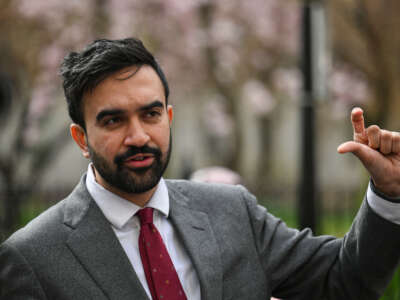Support justice-driven, accurate and transparent news — make a quick donation to Truthout today!
In the final sprint leading up to Zohran Mamdani’s historic win on Tuesday, the New York City mayoral primary took on an unusually refreshing tone: one of cooperation.
Shortly before early voting started, Mamdani, a state assemblymember and unabashed democratic socialist, cross-endorsed with City Comptroller Brad Lander. It was a good match. In spots where 33-year-old Mamdani’s political resume was thin, Lander, a longtime local progressive leader, could add gravitas. What Lander lacked in innovation and charisma, polling in a distant third place, Mamdani had in spades. And by appearing side-by-side at rallies, in social media videos, and on “The Late Show With Stephen Colbert,” the two could work to dispel the lie that Muslim and Jewish New Yorkers need be divided. Their overarching message was clear: Vote for both of us, but keep disgraced former Gov. Andrew Cuomo off your ballot.
This collaborative approach to campaigning was enabled by New York City’s ranked-choice voting system, which voters overwhelmingly adopted for primaries and special elections in a 2019 ballot referendum. New York’s system allows voters to rank their top five candidates rather than choose just one. If no candidate receives the majority of votes, ballot tabulation continues in rounds, with the last-place candidate eliminated each round. When a voter’s top candidate is eliminated, their second-choice candidate gets their vote, and so on.
Don’t miss a beat
Get the latest news and thought-provoking analysis from Truthout.
Advocates began pushing for ranked-choice voting after the 2013 Democratic primaries for city council, when multiple candidates were elected with less than 40 percent of the vote. Those results hardly felt democratic. And proponents argued that, by eliminating the winner-takes-all approach, ranked-choice voting could help lesser-known progressives band together to box out corporate-backed establishment candidates.
That vision was dealt a blow during the city’s first test of ranked-choice voting, when Eric Adams notched the 2021 Democratic nomination for mayor during the eighth round of counting. During that election, it was two moderates, former city Sanitation Commissioner Kathryn Garcia and businessman Andrew Yang, who formed a failed last-minute alliance in the hopes of keeping Adams out of city hall. But Garcia ultimately finished second, and Maya Wiley, a progressive candidate endorsed by the Working Families Party, trailed in third.
Ranked-choice voting might not seem relevant to this year’s primary. After all, while ballot tabulation is still continuing in rounds, Mamdani’s incredible grassroots campaign earned him a clear plurality of the vote right off the bat. Before election night was over, Cuomo had already conceded.
It’s a remarkable feat for Mamdani — a young socialist loudly opposed to Israel’s genocide in Gaza — to beat out Cuomo’s multimillion-dollar, super PAC-funded campaign, which fought tooth and nail to paint Mamdani as a radical antisemite. The vast majority of polls had it wrong; it wasn’t even a close race. And Mamdani’s victory isn’t attributable to just one thing: He mobilized 50,000 volunteers to knock on more than 1 million doors; he had a clear, compelling pitch to New Yorkers for how he plans to make life in the city more affordable; and his media team ran an infectious social video campaign that will likely be studied for years to come.
Cuomo is also, well, a scumbag centrist. He largely ran on his track record as New York governor, but his tenure was marked by scandals. His administration hid the true toll of nursing home deaths at the outset of the COVID-19 pandemic, and he eventually resigned in disgrace after more than a dozen women credibly accused him of sexual harassment. Lander shared his explicit feelings about Cuomo during a triumphant speech following Mamdani’s victory, “Andrew Cuomo is in the past. He is not the present or future of New York City. Good fucking riddance.”
So, no, ranked-choice voting didn’t hand Mamdani his victory. Still, it’s exciting to see how the system can galvanize parts of the left into coalition rather than infighting. It wasn’t just Lander: Michael Blake, a former New York state assemblymember, also cross-endorsed with Mamdani and ramped up television ads in the days before the primary, urging his supporters not to rank Cuomo. The Working Families Party, a progressive group, encouraged its supporters to rank its slate of endorsed candidates and leave Cuomo off their ballot. Perhaps even more than “Vote For Me,” the message to New Yorkers before Election Day became “Don’t Rank Cuomo.”
“People were really excited about a politics that doesn’t feel so selfish,” Lander told New York Magazine in an election postmortem on June 25. “I thought it was interesting yesterday that both Eric Adams and Andrew Cuomo went out of their way to say, ‘I’m only voting for myself.’ And in contrast, the cross endorsement reflects a shared belief in the future of the city.”
This collaborative approach made possible by ranked-choice voting is not only ideologically aligned with the progressive left, but it also presents a materially different opportunity for candidates. Those who fall behind in — increasingly unreliable — polls aren’t pressured to drop out to avoid splitting the vote, leaving their supporters to decide between whoever remains. Since the candidates never stopped running their campaigns, they could, in a way, pool their resources — and each reach their respective voting blocs with messaging they knew would ultimately help propel Mamdani, the clear progressive frontrunner, to victory. As Susan Lerner, one of the architects of ranked-choice voting in New York City and the executive director of Common Cause New York, told the New York Times, the system also requires candidates to work harder to reach a broader swath of potential voters, knocking on more doors in the hopes of receiving second- and third-place rankings. Plus, if ranked-choice voting wasn’t a threat to the status quo, then the Republican National Committee probably wouldn’t have adopted a formal resolution calling to ban it.
Ranked-choice voting presents an exciting and underexplored opportunity for a more deeply democratic process. It is only, however, the tip of the iceberg for building a movement on the left. While Lander has a serious track record of policy wins for New York City’s working class, he is also a self-described liberal Zionist who opposes the Boycott, Divestment and Sanctions movement. And, contrary to right-wing fearmongering, Mamdani is not going to single-handedly bring about the fall of capitalism in New York City (bummer!), because that is not something that the mayor of New York City has the power to do. His role, should he be elected in the November general election, will be to better the quality of life for working-class New Yorkers through social democratic policy-making.
So, much of the work of building power on the left will still have to be done at the grassroots level, in communities and outside of electoralism. But within the political machine, let’s think of this election as a first step — an example of how our democratic processes can more adequately represent the will of the people — and take what lessons we can to strategize for more solidarity in action.
Keep the press free. Fight political repression.
Truthout urgently appeals for your support. Under pressure from an array of McCarthyist anti-speech tactics, independent journalists at Truthout face new and mounting political repression.
We rely on your support to publish journalism from the frontlines of political movements. In fact, we’re almost entirely funded by readers like you. Please contribute a tax-deductible gift at this critical moment!
Read full article at source
Stay informed about this story by subscribing to our regular Newsletter


